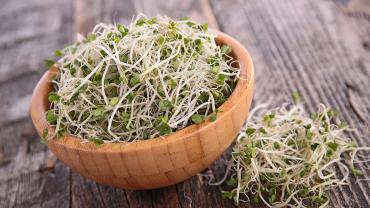
Increased amounts of toxins, pollution, and other xenobiotics assault individuals daily. It is important to maintain a well-working detoxification system to ensure adequate metabolism and excretion of these molecules to help reduce the risk of disease. Compounds in foods, such as sulforaphane, induce the enzymes involved in phase I and phase II detoxification, playing an important role in reducing the impact of environmental toxins.
Broccoli sprouts contain exceptionally high levels of glucoraphanin, which upon mastication or other damage to cruciferous plants becomes sulforaphane. This compound is a known inducer of phase II detox enzymes in large part due to its activation of Nrf2, a transcription factor regulating key antioxidant and phase II detoxifying enzymes including NQO1 and glutathione-S-transferase (GST). In addition to activating Nrf2, sulforaphane may also trigger the expression of key genes involved in detoxification enzyme expression.
A cell culture study demonstrated sulforaphane significantly augments the expression of GSTM1 and NQO1 (two important phase II enzyme genes) on human airway epithelial cells. A similar mechanistic study on ultraviolet-damaged skin cells found that 5 uM of sulforaphane induced the expression of Nrf2 target genes including NQO1 at 1.5 times the normal rate, which led to a significant reduction of sunburn damage in the cells. It also determined an upper limit for benefit, as doses at 25 uM led to a reduction in gene expression and more sunburn damage.
According to an animal study, broccoli sprout extract helps protect the liver thanks to its ability to induce these detoxification enzymes and the synthesis of glutathione. Using DNA microarray technology, the researchers found that broccoli sprouts upregulated the expression of several genes involved in both phase I and phase II pathways, and as the synthesis of glutathione, including those associated with cytochrome P450, glutathione metabolism, GSTM1, and NQO1.
Studies also demonstrated that the increased gene expression correlates with benefits in humans. In one single-blind study assessing sulforaphane on the phase II antioxidant enzymes in airway cells, the researchers found that doses >100 g daily were consistent with induction of nasal phase II enzymes that followed a dose-response pattern. In addition, there was a significant difference in the 200 g dose compared to the placebo.
In a small pilot clinical trial, six of nine participants experienced a twofold or greater upregulation of NQO1 in oral epithelial cells after ingesting glucoraphanin-rich broccoli sprouts extract. In three of those six participants, the same was experienced with sulforaphane-rich broccoli sprout extract.
Studies not only corroborate that sulforaphane increases gene expression, as broccoli sprout extract has also been shown to increase detoxification of toxins. A 12-week randomized control trial found consuming a broccoli-sprout beverage containing 40 uMol sulforaphane and 600 uMol glucoraphanin led to a significant increase in the detoxification and subsequent excretion of airborne pollutants, with a 61% increase of benzene metabolites and 23% of acrolein compared to the placebo.
Supporting the body’s natural detoxification pathways may help to mitigate the dangers posed by toxins, pollution, and xenobiotics. Consuming broccoli and other cruciferous vegetables, especially broccoli sprouts, can help to provide some source of sulforaphane. For those looking for higher doses, a high-quality broccoli sprout extract supplement can help provide this support.
By Kendra Whitmire, MS, CNS